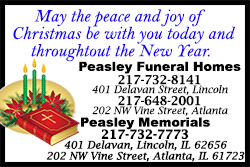|
 In Conzo’s report the primary topic discussed was the fact that
the city is now receiving some of the state funds that had been
previously put on hold due to the state’s budget stand-off. Conzo
reported that the city had received the gaming revenues for the
months of June, July, August and September; and since the first of
December, the Motor Fuel Tax funds for the months of July, August
and September. He noted that the November cash balances were low
because this money had been received after the end of the month, and
also the city had paid three bond payments. In Conzo’s report the primary topic discussed was the fact that
the city is now receiving some of the state funds that had been
previously put on hold due to the state’s budget stand-off. Conzo
reported that the city had received the gaming revenues for the
months of June, July, August and September; and since the first of
December, the Motor Fuel Tax funds for the months of July, August
and September. He noted that the November cash balances were low
because this money had been received after the end of the month, and
also the city had paid three bond payments.
Susan Gehlbach had provided the council with a report in writing,
and asked if there were any questions regarding her report. She also
noted that in the city sewer accounts, the state owes the city more
than $200,000 for services provided at the two prisons. Though the
state habitually runs behind in making their payments, the debt
right now is higher again because of the budget impasse.
 Soon after Gehlbach finished, the meeting was adjourned, and the
regularly scheduled Committee of the Whole meeting was called to
order.
C.O.W. Meeting
License and background checks for Peddlers and Solicitors
City Administrator Clay Johnson led the discussion on establishing a
new license for door-to-door solicitors in Lincoln. Currently, the
city has an ordinance for peddlers requiring a license and fees, but
there is nothing specifically for solicitors.
The difference between the two was explained that peddlers are
calling door to door with a product on hand to sell. Solicitors, on
the other hand, call door to door with the offering of a service or
product to be delivered.
Simple examples of the two types were offered. A peddler might be
someone selling food products from the back of a vehicle with the
product on hand for delivery. A person going door to door offering
an estimate for a home improvement project to be performed at a
later date would be a solicitor.
Currently, peddlers have to pay a license fee of up to $350 if they
wish to work in the city year-round. When they apply for the
license, the local police department runs a check to see if they
have a record locally. Solicitors also have to report to the clerk’s
office but do not have to purchase a permit or undergo a check from
the local police department. They are then given a small card that
says they have registered in the city.
Johnson said that after discussions with City Clerk Susan Gehlbach,
Police Chief Paul Adams and the city's attorney, Blinn Bates, what
he is recommending is the creation of a Solicitor's Permit with fees
attached. He also recommends amending the permits for peddlers and
solicitors both to include background checks and fingerprinting of
the people making the door to door calls.
He said that with no real rules, the city clerk's staff has no means
of denying permits to peddlers and solicitors who may be less than
reputable.
Johnson said early in the discussion, and repeated on several
occasions during the discussion, that the greatest concern in
creating the new ordinance and adding certain requirements to both
ordinances was about promoting public safety for Lincoln residents.
 Johnson also said that when thinking about this situation, the
“knee-jerk” reaction was to ban these types of businesses. However,
Bates had said that there are several cases where cities were
challenged on such bans, and in the courts, the city’s almost always
lost.
The proposed ordinance would include establishing the license and
fee, giving a definition of ‘solicitor’ and establishing what is
being sold and how it will be delivered, required fingerprinting of
all persons working in the area, and establishing hours of operation
that would be from 9 a.m. to 5 p.m. daily.
During the discussion, the topic revealed itself as a two-edged
sword. On one side the goal is to keep the public safe from
out-of-town, perhaps fly-by-night solicitors who could have other
motives for entering a residence, such as robbery. At the same time,
it was brought up by Michelle Bauer that there is, at least, one
reputable brick and mortar business in Lincoln that uses the door to
door solicitation to promote its business and gain new clients. She
wondered how many other local businesses would also be affected.
Johnson said even if the solicitors were connected to a local brick
and mortar, was it "a bad thing" that the city should expect those
door-to-door people to comply with fingerprinting and background
checks. He reiterated that the goal here was public safety.
New alderman Rick Hoefle also wanted to know what affect this would
have on fundraiser efforts by civic and charitable organizations.
Could they be exempted from the new rule? Johnson said he felt the
local groups could be exempted.
Hoefle also wanted to know if the solicitors had to provide anything
that proved they were a legitimate business, such as a Federal
Employer Identification number. Gehlbach said that peddlers supply
their Federal Occupation Tax information, again, solicitors have to
do nothing. Todd Mourning said that he too would like to say
peddlers and solicitors were not allowed in town. But beyond that,
he wondered what liability the city would be opening itself up for
if it did require fingerprinting and background checks. He wondered
if a solicitor checked out legally but then robbed a home, could the
city be sued for allowing them to have the license. Johnson noted
that on the other hand with the city having the proper information
that would include what part of town a peddler or solicitor was
working in, if a robbery were to occur, the city could provide an
immediate lead to a suspect.
[to top of second column] |

The council also discussed the hours of operation that would be allowed. It was
noted that the goal of the door-to-door salesperson is to talk to residents. The
hours outlined are the times of day when many area residents are at work, not
home.
Gehlbach said she was the one who had suggested the specified hours. Her thought
was that these solicitors should not be going door to door after dark. Johnson
noted that the rules were going to allow for Saturdays, so there was still the
opportunity for solicitors to catch people at home.
Throughout the discussion, the primary concern appeared to be how to keep
out-of-town, temporary businesses in check without creating rules that would
hurt local businesses financially. Bauer noted that she didn’t want the fees and
requirements to make the city an unattractive location for businesses. Mourning
wondered why the local businesses couldn’t be exempt from the rule so that it
would only dissuade out-of-town peddlers and solicitors.
Hoefle said that the state does something similar to Mourning’s suggestion in
that when companies file for a business license they file as “in-state” or
“out-of-state” and pay accordingly.
Johnson said he worried that setting up two sets of rules could become “murky”
in defining what is a Lincoln business and what is not. He also noted that the
license fee, which is already set for peddlers, is at $350 a year, less than a
dollar a day. Bauer, on the other hand, said that even if it is only a dollar a
day, for some of the local small businesses that could feel like a lot of money.
Hoefle agreed and said that he didn’t think this new fee would be good for local
business.

Bauer said that she had to wonder how many Lincoln businesses would be affected
by the rule, she could only think of one, but wondered if there were others. She
said that as an alderman, she wanted to know how many businesses aldermen would
hear from if this were passed.
Gehlbach was asked how many peddlers license are issued each year. She estimated
it to be around 40, and said there were more in the summertime than in the
winter.
Tracy Welch asked Johnson to confirm that there was no increase in the fees that
are currently in place. Johnson said that was correct. The fee structure was
determined in 2006. The difference is that the fee would be extended to
solicitors, and there would be the additional cost to the business in doing the
background checks and fingerprinting.
Steve Parrott brought the discussion back to the hours of operation, and
wondered if the hours could be extended during the summer months. Jonie Tibbs
countered that she thought the hours were good as is. She noted that when folks
come home from work and have their evening ahead of them, they don’t want
salesmen knocking on their doors. Conzo noted that while it may not always work,
depending on the sales person, residents always have the option of putting a
notice on their door that says "no solicitors.”
Tibbs asked Gehlbach what she wanted to see happen. Gehlbach said she felt there
was a need to establish rules and fees for solicitors. Mourning stood firm that
he was opposed to forcing locally established businesses to file for another
costly license. He said, “We need to work for the people who are loyal to
Lincoln.”
Bauer said the cost for the license was just part of the issue. Using the same
company as mentioned earlier in the evening, she estimated that by the time the
company paid the license fee and paid for the background and fingerprinting, the
total cost incurred would be more than $500. It was also brought up that the
company could or would have a turnover of personnel throughout a year and would
have to pay for each time a new person was hired to do solicitor work.

Johnson reminded the council that the ultimate goal of these changes was not
financial, but rather to give Lincoln residents a greater peace of mind
regarding sales people calling on them in their homes.
Mayor Marty Neitzel began drawing the discussion to a close by asking if this
topic should be tabled for further research and discussion. Parrott said he
wanted to put it on the agenda, but Mourning did not agree.
Johnson offered an alternative. He suggested that the discussion roll to the
next Committee of the Whole meeting, but in the meantime, the city would put
information regarding this new license and changes to the old license on its
website, and invite public input.
“If there is a concerned group out there that is worried about the fee structure
or how it is going to go down, they can contact us, and we can have a
conversation. We can float it out there and see what response we get,” Johnson
said.
Aldermen appeared to be satisfied with this suggestion. The item is now tabled
until the next Committee of the Whole that would be on January 12th, 2016.
[Nila Smith] |